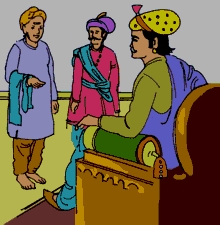2. The Jackal And The Drum
“The king is God. The man who lies to a king perishes. He alone has the power to grant favors.”
A hungry jackal set out in search of food and ended up at an abandoned battlefield whence he heard loud and strange sounds. Scared, he thought, “I must disappear from here before the man who is making these sounds gets me.” After a while he told himself, “I must not run away like that. Let me find out what really the sounds are and who is making them because whether it is fear or happiness one must know its cause. Such a person will never regret his actions. So, let me first look for the source of these noises.”
Warily, the jackal marched in the direction of the sounds and found a drum there. It was this drum, which was sending the sounds whenever the branches of the tree above brushed against it. Relieved, the jackal began playing the drum and thought that there could be food inside it. The jackal entered the drum by piercing its side. He was disappointed to find no food in it. Yet he consoled himself saying that he rid himself
of the fear of sound.
“Therefore”, Damanaka told king Pingalaka, “your majesty should not be afraid of sounds. I seek your
permission to go and see what the sounds are.”
“Okay,” said the king. Taking leave of the king, Damanaka proceeded in the direction of the sound.
The king now began worrying himself about Damanaka's intentions. “He may have a grudge against me for
dismissing him once. Such persons seek revenge. I should not have taken him into confidence. Let me keep
an eye on him. Wise men have always maintained that it is difficult to kill even a weak man who does not
easily trust others but easy to kill a strong man who readily trusts others,” the king thought.
As the king kept an eye on him, Damanaka moved slowly towards Sanjeevaka, the bullock, and found that he was after all an animal and thought, “This is a good omen. This will help me to get back into the good books of the king. Kings never follow the advice of their ministers unless they are in peril or grief. Just as a healthy man never thinks of a doctor, a strong and secure king also never remembers the need for a minister.”
Assured that what he saw was only a bullock, Damanaka returned to the king and told him what he saw.
“Is it true?” the king asked.
Warily, the jackal marched in the direction of the sounds and found a drum there. It was this drum, which was sending the sounds whenever the branches of the tree above brushed against it. Relieved, the jackal began playing the drum and thought that there could be food inside it. The jackal entered the drum by piercing its side. He was disappointed to find no food in it. Yet he consoled himself saying that he rid himself
of the fear of sound.
“Therefore”, Damanaka told king Pingalaka, “your majesty should not be afraid of sounds. I seek your
permission to go and see what the sounds are.”
“Okay,” said the king. Taking leave of the king, Damanaka proceeded in the direction of the sound.
The king now began worrying himself about Damanaka's intentions. “He may have a grudge against me for
dismissing him once. Such persons seek revenge. I should not have taken him into confidence. Let me keep
an eye on him. Wise men have always maintained that it is difficult to kill even a weak man who does not
easily trust others but easy to kill a strong man who readily trusts others,” the king thought.
As the king kept an eye on him, Damanaka moved slowly towards Sanjeevaka, the bullock, and found that he was after all an animal and thought, “This is a good omen. This will help me to get back into the good books of the king. Kings never follow the advice of their ministers unless they are in peril or grief. Just as a healthy man never thinks of a doctor, a strong and secure king also never remembers the need for a minister.”
Assured that what he saw was only a bullock, Damanaka returned to the king and told him what he saw.
“Is it true?” the king asked.
“The king is God. The man who lies to a king perishes. He alone has the power to grant favors.”
“I believe you. Great men do not harm weaker people. They take on only their equals. That is what is unique
about brave people.”
about brave people.”
“What your majesty says is true. Sanjeevaka is great. If your lordship permits me, I will persuade him to be
one of your servants.”
one of your servants.”
“All right, I am taking you back as a minister,” said the king, pleased.
Damanaka at once hurried back to Sanjeevaka and told him to stop bellowing and come and meet his king.
But the bullock wanted who this Pingalaka was. “What? You do not know our lord? Wait, you will know
shortly the cost of this ignorance. There he is, surrounded by his retinue under the banyan tree.” Sanjeevaka
thought his days were numbered and pleaded with Damanaka, “Sir, you seem to be a man of great wisdom
and wit. You alone can save me. I can come only if you can assure me that no harm will come to me.”
Damanaka told the bullock to wait for the right time to meet the king.
Returning to the king, Damanaka told him “My lord, he is not an ordinary being. He is the vehicle of Lord
Shiva. He told me that Lord Shiva had permitted him to feed on the tender grass in the neighborhood of
Jamuna. But I told him that the forest belonged to our lion king who is the vehicle of goddess Chandika. You
are our guest. You can see our king and seek a separate space for you to graze. He agreed to this plan
provided he has an assurance from your majesty.”
“Yes, certainly. But I will need assurance from him in return. Bring him here,” the king told Damanaka.
Going back to the bullock Damanaka advised him, “You have the assurance of the king. But this new
position should not go to your head. We have to work together. That is how we can prosper. Otherwise, he
who does not respect everyone, however high or low, will forfeit the favour of kings like Dantila.”
“What about Dantila?” asked Sanjeevaka.
Damanaka at once hurried back to Sanjeevaka and told him to stop bellowing and come and meet his king.
But the bullock wanted who this Pingalaka was. “What? You do not know our lord? Wait, you will know
shortly the cost of this ignorance. There he is, surrounded by his retinue under the banyan tree.” Sanjeevaka
thought his days were numbered and pleaded with Damanaka, “Sir, you seem to be a man of great wisdom
and wit. You alone can save me. I can come only if you can assure me that no harm will come to me.”
Damanaka told the bullock to wait for the right time to meet the king.
Returning to the king, Damanaka told him “My lord, he is not an ordinary being. He is the vehicle of Lord
Shiva. He told me that Lord Shiva had permitted him to feed on the tender grass in the neighborhood of
Jamuna. But I told him that the forest belonged to our lion king who is the vehicle of goddess Chandika. You
are our guest. You can see our king and seek a separate space for you to graze. He agreed to this plan
provided he has an assurance from your majesty.”
“Yes, certainly. But I will need assurance from him in return. Bring him here,” the king told Damanaka.
Going back to the bullock Damanaka advised him, “You have the assurance of the king. But this new
position should not go to your head. We have to work together. That is how we can prosper. Otherwise, he
who does not respect everyone, however high or low, will forfeit the favour of kings like Dantila.”
“What about Dantila?” asked Sanjeevaka.
























